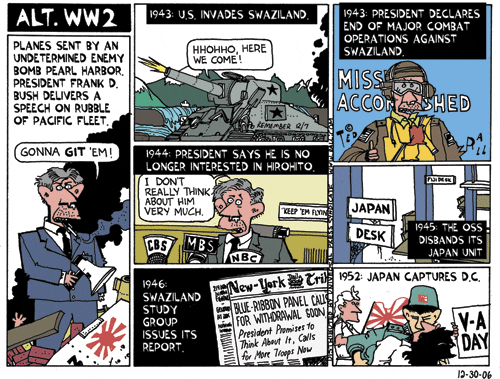Ted Rall is an uncompromising liberal columnist and cartoonist with whom, because he is uncompromising, I at times disagree. Mr. Rall doesn't claim to be open to compromise however, so the occasional stridency of his opinions should come as no surprise, and it is out of that worldview that he serially caricatures President George W. Bush as "Generalissimo El Busho," complete with five o'clock shadow, tin pot dictator's uniform (albeit absent from the above cartoon) and even what appear to be fangs.
Whatever your opinion of his political leanings however, one thing that Mr. Rall brings to the table is firsthand knowledge of Central Asia and a keen mind that is well-suited to observing and understanding the shifting political landscape of that part of the world. In his latest column, Mr. Rall calls attention to a recent event that got little serious news coverage, but that could have serious implications for the United States, especially given the foreign policy blunders of the past six years and the overburdened state of the American military. Said event was the death of Saparmurat "Turkmenbashi" Niyazov, the despotic leader of Turkmenistan, and one of a shrinking number of Soviet-era dictators who held onto power when the U.S.S.R. dissolved:
Whatever your opinion of his political leanings however, one thing that Mr. Rall brings to the table is firsthand knowledge of Central Asia and a keen mind that is well-suited to observing and understanding the shifting political landscape of that part of the world. In his latest column, Mr. Rall calls attention to a recent event that got little serious news coverage, but that could have serious implications for the United States, especially given the foreign policy blunders of the past six years and the overburdened state of the American military. Said event was the death of Saparmurat "Turkmenbashi" Niyazov, the despotic leader of Turkmenistan, and one of a shrinking number of Soviet-era dictators who held onto power when the U.S.S.R. dissolved:
The Central Asian republics of Kazakhstan, Uzbekistan, Tajikistan and - until now - Turkmenistan are all being ruled by the same former Communist Party bosses who ran them in Soviet times. Niyazov's death marks the beginning of the end for the post-Soviet authoritarian order and the beginning of a period of increasing instability, as foreign powers attempt to monopolize access to oil and natural gas resources and pipeline routes. Kazakhstan alone may possess more untapped oil reserves than Saudi Arabia and Iraq combined, and the politics and economies of the Central Asian republics are closely intertwined. What is at stake is nothing less than the security and control of the world economy.As so ably illustrated in the cartoon above, the Bush Administration's deadly adventuring in Iraq has left us exposed to our true enemy, al Qaeda. Unfortunately, what this also means - and which the column points out, is that we are without the means to address other foreign policy crises that arise while we remain mired in the Persian Gulf. Check out Ted Rall's column, and keep an eye on "the 'Stans".

2 comments:
Great cartoon!! Usually only Garfield can make me laugh.....
The real enemy is not Al-Quaeda. To excuse political correctness, the enemy is Islam itself. The seat of its power is Iran.
If you don't agree, then consider this. If the Islamic Groups were to lay down their weapons tomorrow, there would be peace in the middle east. If Israel were to lay down her weapons tomorrow, there would be another holocaust.
Great Blog! Love the design.
Thoughtful, well-written posts.
A-1!
Billy,
Thanks for the kind words, but I have to disagree with your contention that "Islam itself is the enemy." To most of the Arab countries, the problem might just as well be Christianisy or Judaism, and it's just not that simple.
I also do not think it is correct to paint with such a broad brush, and it has little to do with political correctness. There are a host of national actors with their own interests at play in the Middle East, and along with power plays taking place between them, there are struggles between Shia and Sunni Muslims as well. Throw in nations (e.g. Iraq) struggling with artificial borders left over from European colonialism and the world's insatiable desire for oil, and it's a volatile mix, Islam or no Islam.
I believe that Islamic radicalism certainly plays a major role in the turmoil we see today, but Christianity has killed its share of people, too, and as the vast majority of practicing Christians would justifiably take offense at the idea that all Christians were the problem during the Crusades or the Inquisition, I think it's safe to say that "Islam itself" today is not the enemy.
Finally, I would argue that there are two seats of Muslim power in the Middle East: the Shia look to Iran for their cues, and the Sunni largely take their lead from Saudi Arabia.
Post a Comment